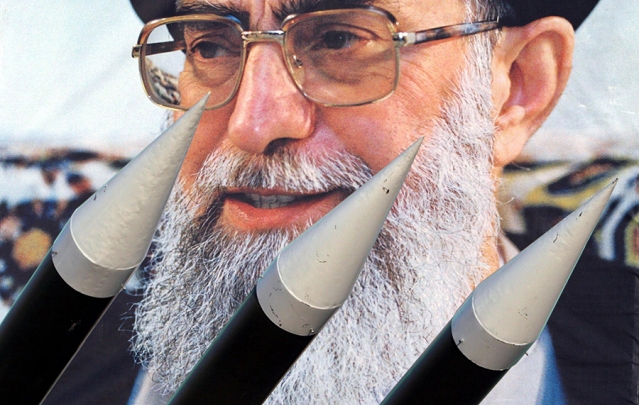US sanctions will check Iranian regime’s ambitions
Dr. Majid Rafizadeh/Arab News/January 15/ 2018
President Donald Trump has set an ultimatum to address and fix the “disastrous flaws” in the Joint Comprehensive Plan of Action (JCPOA) — aka the Iran nuclear deal — in an attempt to more efficiently curb the Iranian regime’s nuclear program. He also imposed new sanctions against 14 Iranian entities and people, including Sadeq Larijani.
Sanctions against Larijani are critical because he is one of the most powerful politicians in Iran. He is a veteran of the regime, a close advisor to and an ally of Iran’s Supreme Leader Ali Khamenei, and the head of the Islamic Republic’s judiciary.
The Iranian regime has threatened a “severe” response to the US sanctions. While these kinds of threats by the Iranian generals are political posturing and boasting, the regime will most likely ratchet up its asymmetric warfare in the region. The Islamic Revolutionary Guard Corps (IRGC) will likely increase its financial, military, intelligence and advisory support to those militias and terrorist groups in the region that have as their mission inflicting damage on US and Arab nations’ national security interests and scuttling their foreign policy.
The Iranian leaders and state-owned Persian outlets have also downplayed Trump’s sanctions to project power to their fundamentalist base and proxies.
Nevertheless, it is important to point out that the White House’s decision on the nuclear deal, as well as the new sanctions, are significant when contextualized in the larger picture. The statements are a political blow and a warning to the leaders of the Iranian regime.
On the one hand, the sanctions imposed on Larijani, as well as those on other influential officials, are a critical victory for human rights defenders and the Iranian people. The sanctions empower the people to further pursue their demands for justice, rule of law, democracy, and to bring those who have committed human rights violations closer to justice.
The sanctions on the IRGC’s cyber unit are also a step towards establishing a larger program that would promote peace and stability by combating agents of the Iranian regime for their concerted attempts in hacking other governmental systems and organizations, and causing billions of dollars of damage.
White House’s decision to set an ultimatum to fix the nuclear deal is a political blow and a warning to Tehran, which has used the JCPOA to heighten its interventionist and expansionist policies in the Arab world.
In addition, the White House is sending a robust message that the Iranian regime will not only be monitored for its nuclear defiance, development, research and proliferation, but it will also be closely watched for its interventions in the region and human rights violations. In other words, the policy towards the Iranian regime is comprehensive; it is not solely conducted through the prism of the JCPOA.
On the other hand, when it comes to waiving nuclear sanctions on Iran “for the last time”, the White House has proved that the critics are wrong again. The US suggested it will rely on soft power and diplomacy this time to address the loopholes in the nuclear deal.
At the international level, this would grant the administration a more robust platform to persuade the UK, France and Germany to fix the nuclear agreement or to pull out of it. Some of the solutions include removing the “sunset clause”, which basically gives the Iranian regime a green light to resume its nuclear program with no restrictions after the expiration of the deal. If other parties do not take necessary and adequate actions to address the shortcomings of the JCPOA, the US has buttressed its position and laid out the groundwork to re-impose the sanctions lifted by the previous administration.
In 90 days, if the nuclear deal is not fixed, the Trump administration has also created a legitimate reason to pull out of the deal, which has contributed to more military adventurism by the Iranian regime.
At the domestic level, in order to eliminate excuses, the White House is also giving the US Congress additional time to either work on legislation that would address the loopholes of the nuclear deal, or will increase the president’s leverage vis-a-vis other members of the JCPOA. This would enable him to pressure the other JCPOA members into fixing some of the inadequacies of the nuclear deal, such as requiring Iran to allow its military sites to be inspected for nuclear development, research, weaponization and proliferation.
Iran must also be required to adhere to the spirit of the nuclear deal, as it is continuously heightening interventionist and expansionist policies in the Arab world and violating human rights inside Iran and abroad. The nuclear deal has empowered the IRGC and its militias in the region due to the sanctions relief. This has further radicalized, militarized and destabilized the region. Iran continues to escalate its antagonistic policy towards other Arab nations, the US and other Western nations.
Although the Iranian regime is downplaying the US actions and statements, the new sanctions and the final waiver of nuclear sanctions builds a robust plan, which will more effectively counter the Iranian regime’s hegemonic ambitions and destructive behavior in the region.
• Dr. Majid Rafizadeh is a Harvard-educated Iranian-American political scientist. He is a leading expert on Iran and US foreign policy, a businessman and president of the International American Council. He serves on the boards of the Harvard International Review, the Harvard International Relations Council and the US-Middle East Chamber for Commerce and Business. Twitter: @Dr_Rafizadeh























